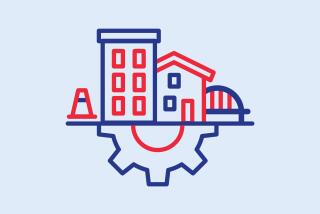IRVINE : $5 Million in Bonds to Pay for Underpass
- Share via
The City Council has agreed to issue $5 million worth of fixed-rate bonds to provide the money to build a railroad underpass along Culver Drive.
The unanimous vote Tuesday represents a key move in the effort to build the underpass, which officials said will improve traffic flow on one of the city’s busiest streets.
Council members expressed concern about assuming the $5-million debt during weak economic times, but they insisted that the project needs to be completed and that the city isn’t likely to find a better deal.
The project calls for Culver Drive to be diverted under railroad tracks that run from Los Angeles to San Diego. The crossing is considered unsafe by some residents, who also complain about the loud train whistles.
Train traffic through Irvine is expected to double in the next few years, making a bypass at Culver Drive important to avoid traffic congestion, city officials said.
Originally, the city expected the underpass to cost about $20 million. But city staffers were able to find contractors willing to build the project for about $15.7 million.
About 70% of the funding for the project will be provided by outside sources, including the state. That leaves the city’s contribution at about $5.5 million.
“I don’t think we’ll see a better (deal) than 70% funding,” said Councilwoman Paula Werner, echoing the sentiments of other council members.
City Manager Paul O. Brady Jr. said that by approving the project now, the city received a better deal from contractors.
“With this economy, people are hungry for work. They sharpen their pencils and tend to (offer) better contract prices,” he said.
The city plans to repay the loan in annual installments of $450,000 over 20 years. The bond issue has a fixed rate of 5.6%.
Councilwoman Christina L. Shea said she voted for the plan but was hesitant out of concern that unforeseen problems with construction or outside funding sources could increase the cost and might force the city to borrow more.
More to Read
Sign up for Essential California
The most important California stories and recommendations in your inbox every morning.
You may occasionally receive promotional content from the Los Angeles Times.











